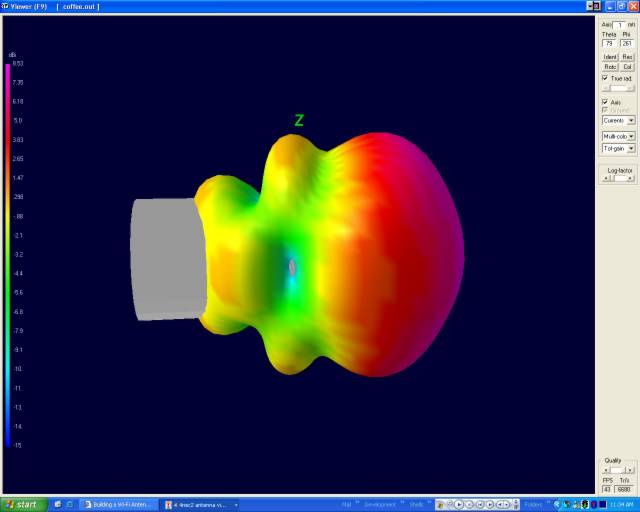Home-Brew Antennae: Difference between revisions
No edit summary |
|||
| (39 intermediate revisions by 3 users not shown) | |||
| Line 1: | Line 1: | ||
== | ==Omnidirectional Antennae== | ||
It is possible to make a homebrew omnidirectional antenna, as shown in the guides listed on [[Links#Antennae]]. | |||
The | ==Directional Antennae== | ||
===Cantenna=== | |||
The instructions shown the websites listed on [[Links#Antennae]] were used to build some cantennae as shown in the pictures: | |||
[[Image:P9170496.jpg|thumb|left]] | |||
[[Image: | [[Image:Cantenna.jpg|thumb|left]] | ||
[[Image: | [[Image:Cantenna2.jpg|thumb|left]] | ||
[[Image:Circular waveguide optimise.xls|Spreadsheet | |||
'''Left to right,Cantenna on Tripod, Conical Feed element and Cantenna with bicycle spoke element''' | |||
This [[Image:Circular waveguide optimise.xls|Spreadsheet]] can be used to optimise the variables when building a cantenna. | |||
===Sectoral Antenna=== | |||
A sectoral antenna provides the best of both worlds in terms of gain as well as beam-width and can be applied to many situations in mesh networking. | |||
====Turn an Omni into a Sector==== | |||
The reflector designs shown, found at [http://www.freeantennas.com/ Freeantennas.com] can be applied to a standard omni and will turn the omni into a sectoral antenna. | |||
[[Image:Template.jpg|thumb|left]] | |||
[[Image:Wet-11.jpg|thumb|left]] | |||
Metal sheeting can be used for the reflector, however, the ideal would be some sort of mesh metal, with holes smaller than 1/4 wavelength (<3cm), so that the antenna is not affected by wind as much. | |||
==Simulation== | ==Simulation== | ||
[http://www. | [http://www.nec2.org/ NEC 2] was used to generate the simulated field pattern for a cantenna with the dimensions used in our first test cantenna. | ||
[ | [[Image:Simulation.jpg]] | ||
Latest revision as of 10:11, 30 May 2006
Omnidirectional Antennae
It is possible to make a homebrew omnidirectional antenna, as shown in the guides listed on Links#Antennae.
Directional Antennae
Cantenna
The instructions shown the websites listed on Links#Antennae were used to build some cantennae as shown in the pictures:
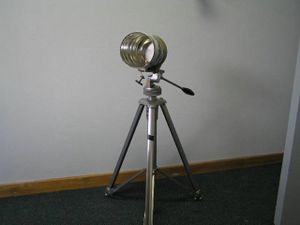
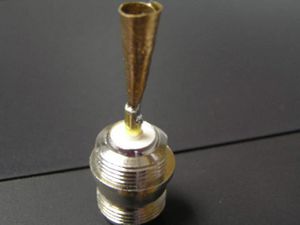
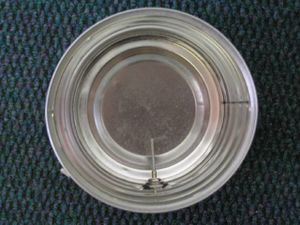
Left to right,Cantenna on Tripod, Conical Feed element and Cantenna with bicycle spoke element
This File:Circular waveguide optimise.xls can be used to optimise the variables when building a cantenna.
Sectoral Antenna
A sectoral antenna provides the best of both worlds in terms of gain as well as beam-width and can be applied to many situations in mesh networking.
Turn an Omni into a Sector
The reflector designs shown, found at Freeantennas.com can be applied to a standard omni and will turn the omni into a sectoral antenna.
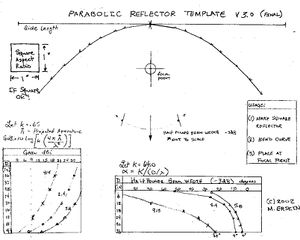
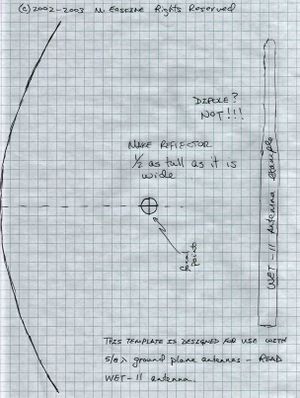
Metal sheeting can be used for the reflector, however, the ideal would be some sort of mesh metal, with holes smaller than 1/4 wavelength (<3cm), so that the antenna is not affected by wind as much.
Simulation
NEC 2 was used to generate the simulated field pattern for a cantenna with the dimensions used in our first test cantenna.
